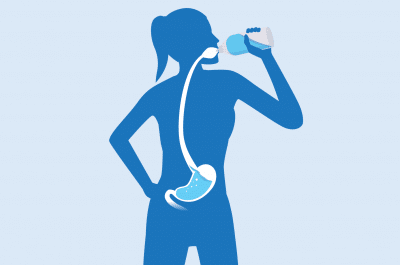Staying adequately hydrated is essential for overall health, and its role in digestion is often underestimated. Water is not just a thirst quencher; it’s a vital component in breaking down food, absorbing nutrients, and maintaining a healthy gut. This article delves into the significance of water in improving digestion, exploring how it alleviates common digestive problems and supports a balanced gut microbiome.
From facilitating saliva production to preventing constipation, water’s impact on the digestive process is far-reaching. Understanding how water aids in each stage of digestion can empower you to make informed choices about your hydration habits, leading to improved digestive health and overall well-being.
Water Aids in the Breakdown of Food
The digestive process begins in the mouth, where saliva is produced to initiate the breakdown of food. Adequate water intake is crucial for saliva production, as saliva contains enzymes that break down carbohydrates and fats, making food easier to digest. Without sufficient water, saliva production decreases, potentially leading to inefficient food breakdown and digestive discomfort.
Drinking water before or during meals can further aid in this process by helping to soften food and facilitate its passage through the esophagus. This can be particularly beneficial for individuals with difficulty swallowing or those prone to acid reflux. Furthermore, proper hydration ensures that the stomach can effectively break down food into smaller particles, optimizing nutrient absorption in the small intestine.
Water Facilitates Nutrient Transportation
After food is broken down, the body needs water to absorb and transport nutrients to cells and organs. Water dissolves vitamins, minerals, and other essential nutrients, allowing them to be easily absorbed into the bloodstream and carried throughout the body. Dehydration can impair this process, leading to nutrient deficiencies and reduced energy levels.
The bloodstream relies on water to transport nutrients to and from the digestive system. When the body is dehydrated, blood volume decreases, making it more difficult for nutrients to reach their intended destinations. This can result in fatigue, weakened immunity, and impaired cognitive function. Maintaining adequate hydration ensures that the body receives the maximum benefit from the food you consume.
Water Prevents Constipation
Constipation, a common digestive problem, can often be alleviated by increasing water intake. Water softens stool, making it easier to pass and promoting regular bowel movements. When dehydrated, the colon absorbs more water from the stool, leading to dryness and difficulty in passing waste. Drinking plenty of water helps to maintain stool consistency and prevent constipation.
Fiber, an essential nutrient for digestive health, works best when combined with adequate water intake. Fiber adds bulk to the stool, while water helps to soften it, facilitating smooth passage through the digestive tract. Incorporating fiber-rich foods such as fruits, vegetables, and whole grains into your diet, along with sufficient water intake, can effectively prevent and relieve constipation.
Water Supports Gut Health
The gut microbiome, a complex community of bacteria residing in the digestive system, plays a crucial role in digestion, immunity, and overall health. Water helps maintain a healthy balance of gut bacteria by flushing out toxins and promoting the growth of beneficial bacteria. Dehydration can disrupt the gut microbiome, leading to digestive problems and weakened immunity.
Adequate hydration supports the growth of beneficial bacteria in the intestines, contributing to a healthy gut environment. Conversely, sugary drinks and processed beverages can dehydrate the body and negatively impact gut health. Choosing water over these alternatives is a simple yet effective way to support a thriving gut microbiome and optimize digestive function.
Water Reduces Bloating and Acid Reflux
Bloating and acid reflux are common digestive discomforts that can often be managed with adequate hydration. Water helps to dilute stomach acid, reducing the likelihood of acid reflux. It also aids in moving food through the digestive tract, preventing the buildup of gas that can lead to bloating.
Drinking water between meals can help to prevent bloating by flushing out excess sodium and reducing water retention. It is important to avoid drinking large amounts of water right before or during meals, as this can dilute stomach acid and interfere with digestion. Sipping water throughout the day is a more effective way to stay hydrated and prevent digestive discomfort.
Conclusion
Water is an indispensable component of the digestive process, facilitating the breakdown of food, the absorption of nutrients, and the maintenance of a healthy gut. From preventing constipation to reducing bloating and acid reflux, the benefits of adequate hydration for digestive health are numerous. By making conscious choices to prioritize water intake, you can significantly improve your digestive function and overall well-being.
Incorporating simple hydration habits into your daily routine can have a profound impact on your digestive health. Carry a water bottle with you throughout the day, set reminders to drink water regularly, and choose water over sugary beverages whenever possible. Your digestive system will thank you for it.
